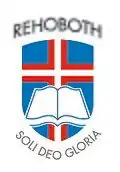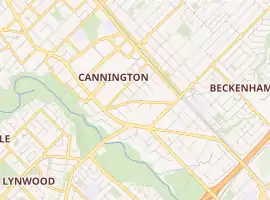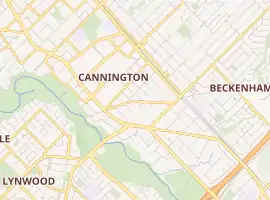Rehoboth Christian College
Rehoboth Christian College is a dual-campus independent trans-denominational Protestant co-educational primary and secondary day school, located in the south-eastern corridor of Perth, Western Australia. The College comprises a Year K to Year 6 campus in the suburb of Wilson, and a Year K to Year 12 campus in the suburb of Kenwick. The College currently enrols some 650 students across its two campuses.
| Rehoboth Christian College | |
|---|---|
 | |
| Location | |

| |
Australia | |
| Coordinates | 32°02′01″S 115°58′46″E |
| Information | |
| Former names |
|
| Type | Independent Christian co-educational primary and secondary day school |
| Motto | Latin: Soli Deo Gloria (For the Glory of God Alone[1]) |
| Denomination | Trans-denominational Protestant |
| Established | 1966 |
| Chairman | Frank van der Kooy |
| Employees | ~149 |
| Enrolment | c. 805 |
| Campus | |
| Colour(s) | Blue, red and white |
| Slogan | Purpose, Partnership, Preparation - Committed to Distinctly Christian Education[2] |
| Affiliations |
|
| Website | www |

| |
Rehoboth pioneered the establishment in Western Australia of a parent-directed style of school governance and a distinctive approach to curriculum which have since been adopted by a number of other schools. Rehoboth is affiliated with Christian Education National[3] and with the Association of Independent Schools of Western Australia.[4]
Rehoboth Christian College was formerly called Rehoboth Christian School and for many years using separate designations, was called Rehoboth Christian Primary School and Rehoboth Christian High School.
History
Rehoboth is part of a Christian school movement having its origins in Europe and brought to Australia by post-World War II migrants.[5] Its distinctive parent-governance model was innovative in an era when most Christian schools were run by churches.[6] It was established by an association of parents, The Association for Christian Education (Perth) Inc., which was established in 1959,[7] and was the first school of its type in Western Australia when it opened its doors in 1966.[8] Its main distinctive by comparison with the church-operated schools was an intent to relate Christian belief to all areas of the curriculum.[9] At the same time, teaching was focused on the mainstream curriculum, and the school consciously avoided packaged curriculum materials such as Accelerated Christian Education. The role of the parent was paramount,[10][11] both in school governance and in taking final responsibility for the education of the child,[12] of which schooling was considered only a part.
The College commenced as a primary school only, and it was another 11 years before, in 1977, a secondary campus was established[13] in temporary premises at Kensington. Known in its first year as Rehoboth Christian Secondary School, it moved to its current location at Kenwick in 1979, becoming Rehoboth Christian High School, in keeping with conventional local nomenclature practice at the time. For many years the Primary and Secondary Campuses operated distinctly, but in 2005 Primary and Pre-Primary classes also commenced on the Kenwick site.[13] An earlier second Primary work at the southern Perth suburb of Yangebup, commenced at that more remote location from its core population because of restrictions imposed by the Hawke-Keating Labor government in the early 1990s, had ultimately failed because of its distance from the other campuses, and closed its doors after 10 years. In 2009 the school became Rehoboth Christian College.
The philosophy of schooling represented by Rehoboth was taken up by other Christians[14] in Western Australia in the early 1980s, as several parent associations were established in other parts of Perth leading to the establishment of similar schools, as well as in several country centres across Western Australia. In the early 21st century Rehoboth was one of the smaller schools of its type in Western Australia as it sought to maintain its distinctiveness and the integrity of its philosophy.
House system
Rehoboth uses a house system through which students participate in inter-house activities and competitions. The three houses are:
- Newton (green and gold), named for 18th century pastor, hymn writer, former slave trader and anti-slavery campaigner John Newton
- Tyndale (black and white), named for 16th century church reformer and Bible translator William Tyndale
- Wycliffe (red and blue), named for 14th century church reformer and Bible translator John Wycliffe
Notable alumni
- Nick Goiran - Member of the Western Australian Legislative Council representing South Metropolitan Region
- Andrew Swallow - AFL footballer
- David Swallow - AFL footballer
References
- "Our Story". Rehoboth Christian College. Retrieved 7 March 2016.
- "What is a Distinctly Christian Education?". Rehoboth Christian College. Retrieved 7 March 2016.
- "Rehoboth Christian College". Search for School. Christian Education National. Archived from the original on 17 September 2009. Retrieved 19 August 2009.
- "Rehoboth Christian College". Search for School. Association of Independent Schools of Western Australia. Archived from the original on 25 July 2008. Retrieved 19 August 2009.
- Justins, C. & Sanber, S. (2002): The Values of Faith-based Schooling - a Case Study, Australian Association for Research in Education. Retrieved on 20 August 2009
- Vanden Berg, J. (2005): "Christian Day Schooling in Christian Reformed Churches of Australia". REC Focus. 5(3 & 4):45-6. Retrieved on 20 August 2009
- Deenick (ed.), J. (1991): A Church En Route: 40 Years Reformed Churches of Australia, Reformed Churches Publishing:241. ISBN 0-9590727-7-2
- Deenick (1991):245
- Justins, C. (2002): Christian Parent Controlled Schools in Australia - a Study of the Relationship Between Foundational Values and Prevailing Practices Archived 17 October 2009 at the Wayback Machine, Doctoral thesis, Australian Catholic University:43. Retrieved on 21 August 2009
- Lambert, I. & White, A. (1996): "Parents and Teachers as Partners in Education", Reclaiming the Future: Australian Perspectives on Christian Schooling. Macquarie University. Centre for the Study of Australian Christianity:50-1. ISBN 1-86408-174-0
- Weeks, N. (1988): The Christian School: an Introduction. Banner of Truth Trust:7-8. ISBN 0-85151-526-6.
- Justins (2002):124.
- Rehoboth Christian College. Our History. Retrieved on 21 August 2009.
- Deenick (1991):248-9